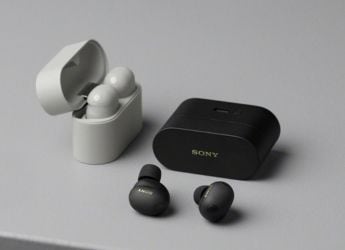- Home
- Audio
- Audio Reviews
- Google Pixel Buds Pro Review: The Android Focused Flagship TWS
Google Pixel Buds Pro Review: The Android-Focused Flagship TWS
ANC, wireless charging, and hands-free Google Assistant makes the Pixel Buds Pro a feature-filled flagship true wireless headset
The Google Pixel Buds Pro is priced at Rs. 19,990 in India
Many brands which make both smartphones and audio products tend to engineer them to work slightly better with each other, in the hope that this tight integration would keep buyers locked into their ecosystem. Some examples include the Apple AirPods Pro, OnePlus and Oppo's true wireless headsets, and Samsung's range of Galaxy Buds headsets, all of which tend to have a bit of an edge in terms of features or capabilities when used with smartphones from the same respective brands.
Google's Pixel Buds lineup has taken a similar approach, with its usability and features geared towards Android smartphones and tablets. However, what has been lacking in the past is the presence of a proper flagship true wireless headset from Google. That has now changed, with the launch of the Google Pixel Buds Pro which is priced at Rs. 19,990 in India.
With active noise cancellation, wireless charging, and hands-free access to Google Assistant, the Pixel Buds Pro is a feature-filled TWS option that looks to challenge flagship true wireless headsets from brands such as Apple, Samsung, and Sony, among others. Is this the best flagship true wireless headset for Android users? Find out in this review.
Google Pixel Buds Pro design and features
Google is consistent with its design and styling for the Pixel Buds series, and the Pixel Buds Pro stick to the script in terms of look and feel. That said, the earpieces are considerably larger and bulkier than the Pixel Buds A-Series, but the shape means that the earpieces don't stick out quite as much as you'd think. In fact, all of that bulk not only ensures a secure and fairly comfortable fit, but also excellent passive noise isolation.
Each earpiece has three microphones — one on the inside and two on the outside — along with a Google logo on top of the touch-sensitive zone for the controls. Only the touch-and-hold gesture is customisable on the Google Pixel Buds Pro, and can be set to toggle active noise controls (cycling between ANC and transparency mode), with separate functions assignable to each earpiece. Tap gestures control playback, and swipe gestures control volume adjustments.
The touch controls were usually precise, but there were occasions when the swipe gestures registered as taps, which was a bit bothersome. I had the customisable function set to cycle between the noise control modes, since invoking Google Assistant could be done hands-free with the ‘Hey Google' or ‘OK Google' voice commands.
Google Assistant itself worked very well on the Pixel Buds Pro. The wake phrase worked reliably, and it's possible to do a lot with the voice commands, including searching for information and controlling IoT devices linked to your Google account, as well as controlling functionality such as playback and volume on the earphones themselves. Voice assistant functionality on the Google Pixel Buds Pro was as good, if not better, than on the Google Nest Audio smart speaker.
![]()
The case of the Google Pixel Buds Pro has USB Type-C and Qi wireless charging
The charging case of the Google Pixel Buds Pro is quite similar to that of the mid-range Pixel Buds A-Series in design, with an egg-like shape, and contrasting colours for the outside and inside (on the white variant). The USB Type-C port is at the bottom, the pairing button is at the back near the bottom, and there is a single indicator light just below the lid which is otherwise hidden when not illuminated.
It's a convenient shape and size, and is easy to store in clothing pockets or small handbags. Notably, the charging case of the Pixel Buds Pro supports Qi wireless charging. The sales package includes a total of three pairs of silicone ear tips of different sizes, but no charging cable, which is a bit disappointing given the price of the headset.
In India, the Google Pixel Buds Pro is available in just a single colour variant — black earpieces and white charging case. The earpieces are IPX4 rated for water resistance, while the charging case also has an IPX2 rating. The headset also has sensors for in-ear detection and opening or closing the case to ensure faster connectivity.
Google Pixel Buds Pro app and specifications
Just as the Apple AirPods range needs an iOS device to be used to its full potential, the Google Pixel Buds Pro requires an Android device to make the most of its features. This includes the Pixel Buds app, which is only available for Android. As such, you can use the earphones with an iPhone if you want by simply pairing the headset to the iOS device, as you would with any other pair of Bluetooth earphones.
The Pixel Buds app is quite well put together with a neat home screen that lists all the key functions efficiently. When connected, the top portion of the app shows a visual display of the battery levels of each earpiece and the case separately. Android OS will also push a drop-down notification for the battery levels by default, when the headset is connected.
Other options include specifics for Google Assistant on the headset, a guide for the touch controls, sound modes, ear-tip seal check, in-ear detection, audio switching for compatible devices linked to your Google account, and multi-point connectivity. You can also carry out firmware updates for the Pixel Buds Pro using the app.
![]()
Although excellent, the Pixel Buds app is only available on Android right now
Disappointingly, there are no detailed equaliser settings, beyond a control to increase the lows and highs at low volume levels. There is also no customisability for the ANC as you only get a single level, but you can do an ear-tip seal check in the app to ensure that the noise isolation is optimised for the ANC.
The Google Pixel Buds Pro have 11mm dynamic drivers, and use Bluetooth 5 for connectivity, with support for the SBC and AAC Bluetooth codecs. Given the focus on Android source devices, I found the lack of support for advanced Bluetooth codecs quite a let-down. Competing devices such as the Sony WF-1000XM4 and Sennheiser Momentum True Wireless 3 both support advanced codecs, and are available for roughly the same price as the Pixel Buds Pro.
Google Pixel Buds Pro performance and battery life
The Google Pixel Buds Pro goes up against some capable competition in the premium TWS segment, including the Sony WF-1000XM4 and Apple AirPods Pro. However, its positioning is fairly different from those two options given that its feature-set is positioned towards Android smartphone and tablet users.
While direct comparisons against the AirPods Pro wouldn't be entirely fair, the Pixel Buds Pro does definitely fall a bit short of the Sony WF-1000XM4 and Sennheiser Momentum True Wireless 3, both of which are device agnostic with regards to app support, and have advanced Bluetooth codec support.
Objectively though, there's a lot to like with the Google Pixel Buds Pro, and I quite enjoyed my time with the earphones thanks to the rich, warm, and melodic sound. The Pixel Buds Pro have been tuned well, and the sound gives the earphones a different character which is quite refreshing compared to the more analytical and detail-oriented sonic signatures of competing options.
Listening to Stay With Me from Calvin Harris' latest album, I loved the warmth in the sound. The lows in the deep, mid-tempo beat had a distinctly powerful grunt, giving the sound a strong sense of fun. The sonic signature is a classic U-shaped one, giving the lows and highs an audible boost. Fortunately though, the mid-range didn't drop off too much; Justin Timberlake, Pharrell Williams, and Halsey's widely varied vocal styles sounded great through the track, despite the definite warmth in the sound.
Turning the volume up and listening to Coldplay and Beyonce's Hymn For The Weekend was rather enjoyable, with the track sounding significantly different on the Google Pixel Buds Pro as compared to my current reference-point for true wireless earphones, the Sony WF-1000XM4. While the latter delivered more detail, the former offered up more character, and sense of aggression. The sound felt more engaging and energetic, although the Pixel Buds Pro did seem to struggle a bit with the busier parts of the track with the volume turned up.
Although the soundstage did feel fairly wide and clean, it sometimes sounded like far too much was going on, with the earphones unable to adapt as quickly to the track's nuances as competing options. It's here that the Google Pixel Buds Pro falls a bit short, and this is its only real drawback. Slower, gentler tracks such as Bambro Koyo Ganda by Bonobo sounded reasonably detailed and cohesive on the Pixel Buds Pro, while fast, busy music seemed to cause the earphones to struggle, with the lack of advanced codec support being the obvious reason for this.
Active noise cancellation on the Google Pixel Buds Pro is decent, with a good amount of noise reduction both indoors and outdoors. It seems to be particularly effective against low frequency sounds, cutting out the whirring of a ceiling fan when at home and much of the noise from a nearby railway line when outside.
I did hear a faint hum with the earphones on and with no music playing, that strangely could not be heard with the earphones off. However, this pretty much went away when music was playing, so I didn't think much of it. On the whole, active noise cancellation on the Pixel Buds Pro is fairly effective both indoors and outdoors.
![]()
Although the sound is fun and energetic, the lack of advanced Bluetooth codec support holds the Pixel Buds Pro back
Placing and receiving calls on the Google Pixel Buds Pro was a breeze, and Google Assistant's excellent hands-free mode made it possible to do much of this without even holding my phone. Call quality itself was decent both indoors and outdoors, and ANC made a significant difference in improving the sound.
Battery life on the Google Pixel Buds Pro is decent on the earpieces, which ran for a little over six hours on a single charge with ANC operational and at moderate volume levels. The charging case added two additional charges, for a total runtime of around 18 hours per charge cycle. The overall figure isn't exceptional, but it isn't too bad either.
Verdict
Although the Google Pixel Buds range has existed for a while as the company's ‘ecosystem' play, it's been missing an all-important flagship device, until now. The Google Pixel Buds Pro delivers exactly what you'd expect from a flagship headset, with useful features such as active noise cancellation, app support, and responsive hands-free access to Google Assistant.
While the sound quality is fun and full of character, the Google Pixel Buds Pro only falls short in terms of detail and cohesiveness, as compared to competing options such as the Sony WF-1000XM4, which come across as more insightful and analytical. That said, this is a good pair of true wireless earphones that I had a great time reviewing, particularly for its reliable and capable hands-free Google Assistant access.
Get your daily dose of tech news, reviews, and insights, in under 80 characters on Gadgets 360 Turbo. Connect with fellow tech lovers on our Forum. Follow us on X, Facebook, WhatsApp, Threads and Google News for instant updates. Catch all the action on our YouTube channel.
Related Stories
- Samsung Galaxy Unpacked 2026
- iPhone 17 Pro Max
- ChatGPT
- iOS 26
- Laptop Under 50000
- Smartwatch Under 10000
- Apple Vision Pro
- Oneplus 12
- OnePlus Nord CE 3 Lite 5G
- iPhone 13
- Xiaomi 14 Pro
- Oppo Find N3
- Tecno Spark Go (2023)
- Realme V30
- Best Phones Under 25000
- Samsung Galaxy S24 Series
- Cryptocurrency
- iQoo 12
- Samsung Galaxy S24 Ultra
- Giottus
- Samsung Galaxy Z Flip 5
- Apple 'Scary Fast'
- Housefull 5
- GoPro Hero 12 Black Review
- Invincible Season 2
- JioGlass
- HD Ready TV
- Latest Mobile Phones
- Compare Phones
- Lava Yuva Star 3
- Honor X6d
- OPPO K14x 5G
- Samsung Galaxy F70e 5G
- iQOO 15 Ultra
- OPPO A6v 5G
- OPPO A6i+ 5G
- Realme 16 5G
- Asus Vivobook 16 (M1605NAQ)
- Asus Vivobook 15 (2026)
- Brave Ark 2-in-1
- Black Shark Gaming Tablet
- boAt Chrome Iris
- HMD Watch P1
- Haier H5E Series
- Acerpure Nitro Z Series 100-inch QLED TV
- Asus ROG Ally
- Nintendo Switch Lite
- Haier 1.6 Ton 5 Star Inverter Split AC (HSU19G-MZAID5BN-INV)
- Haier 1.6 Ton 5 Star Inverter Split AC (HSU19G-MZAIM5BN-INV)


















